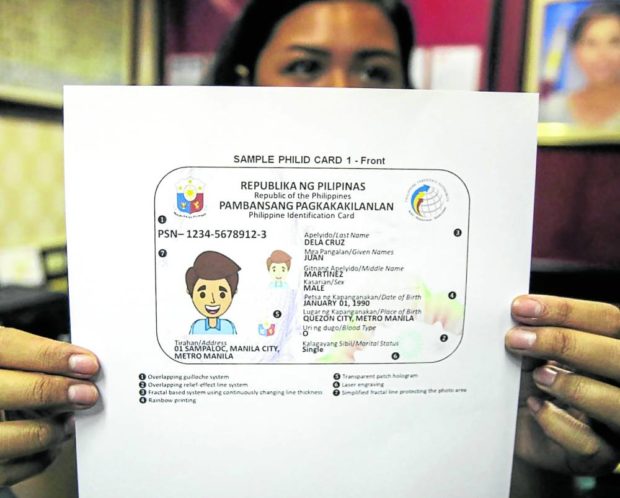
PAPER ID | A congressional worker shows a sample of the PhilSys ID presented to the House of Representatives when the Philippine Statistics Authority was seeking funding. (INQUIRER FILE PHOTO)
MANILA, Philippines — Trying to work around the government’s continuing failure over the past five years to provide identification cards it claimed to be “essential,” President Ferdinand Marcos Jr. has agreed to a digital national identification system in the meantime.
“There have been some delays, but the problems are being addressed,” Socioeconomic Planning Secretary Arsenio Balisacan said in a Palace press briefing on Wednesday.
Balisacan, who heads the National Economic and Development Authority (Neda) and its attached Philippine Statistics Authority (PSA), said the President agreed amid the PSA’s failure to meet its implementation target.
A national ID card is required of every Filipino citizen under the Philippine Identification System Act (Republic Act No. 11055), which was enacted into law in 2018 with a five-year implementation period.
Balisacan said the PSA was supposed to collect personal data as well as produce and distribute ID cards.
“But now, that has changed. We realized that we should first make those digital IDs so that anyone who has a phone can already use the digital ID and that is now the primary responsibility of the DICT (Department of Information and Communications Technology),” Balisacan explained.
“There’s now an agreement between the PSA and the DICT to transfer the provision of digital ID to DICT while PSA will continue with its physical ID production and distribution,” he added.
Balisacan maintained that, after five years, the government is more than halfway in the production of the physical IDs and wants to speed up the distribution before the end of the year.
Ordinary Filipinos were, for years, resistant to a national ID system, because of doubts on the government’s ability to secure their personal data, but Balisacan continues to maintain a national ID is essential.
“It’s very important for us that that’s completed because it will reduce transaction cost in government as well in the private sector. It will allow us to save a lot of resources from our ayuda (cash aid distribution) because many of the income transfers targeted for the poor do not end up with the poor because there are leakages,” he said.
With the digital ID, he said financial assistance such as the cash aid for disaster victims and indigents and the recently launched food stamp program of the social welfare department could now be delivered efficiently.
“Each one of us will have a unique ID, unique number and you can no longer tamper with that. So, there will no longer double benefits, ghost beneficiaries, or those kinds of issues,” Balisacan said.

